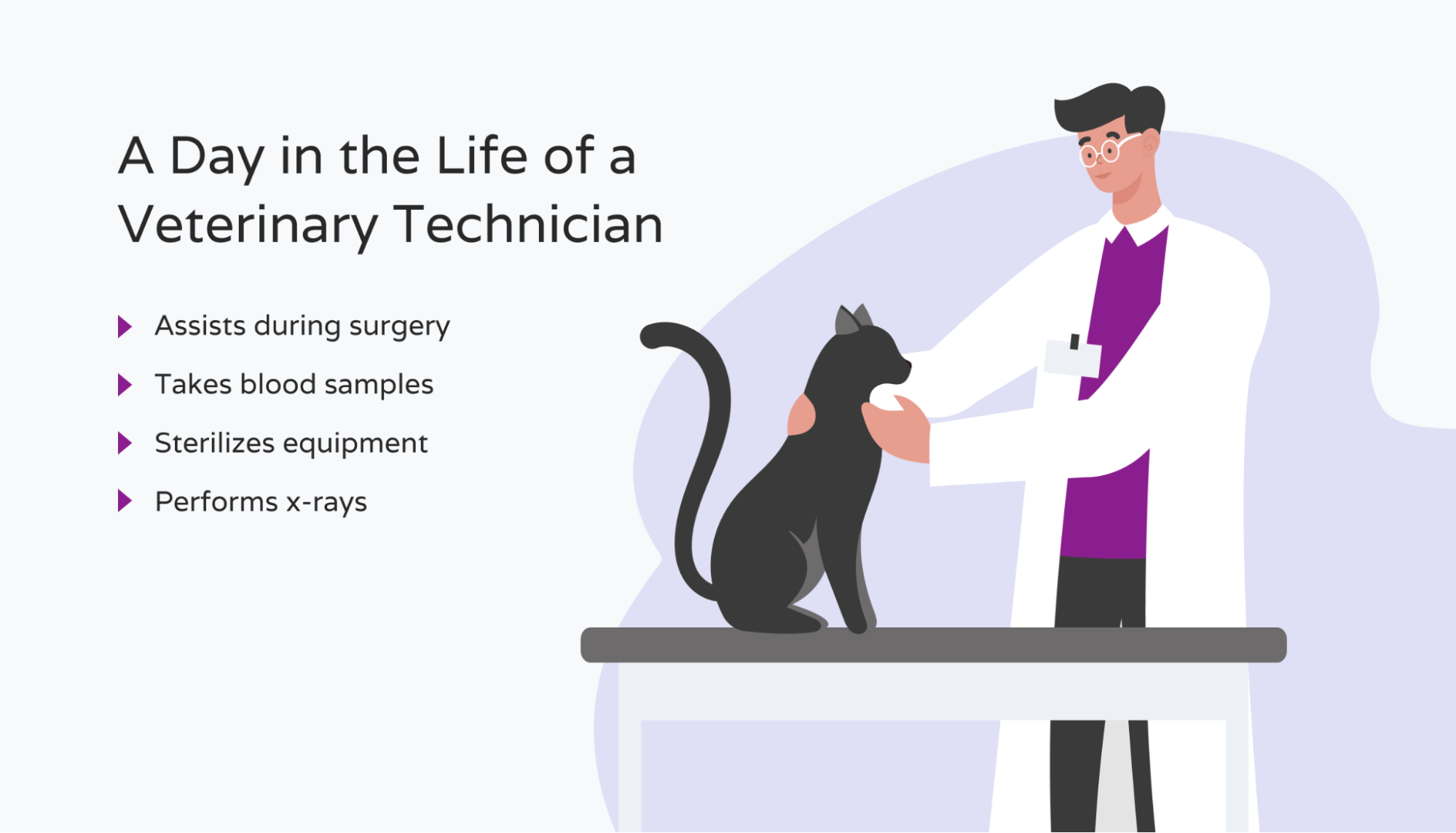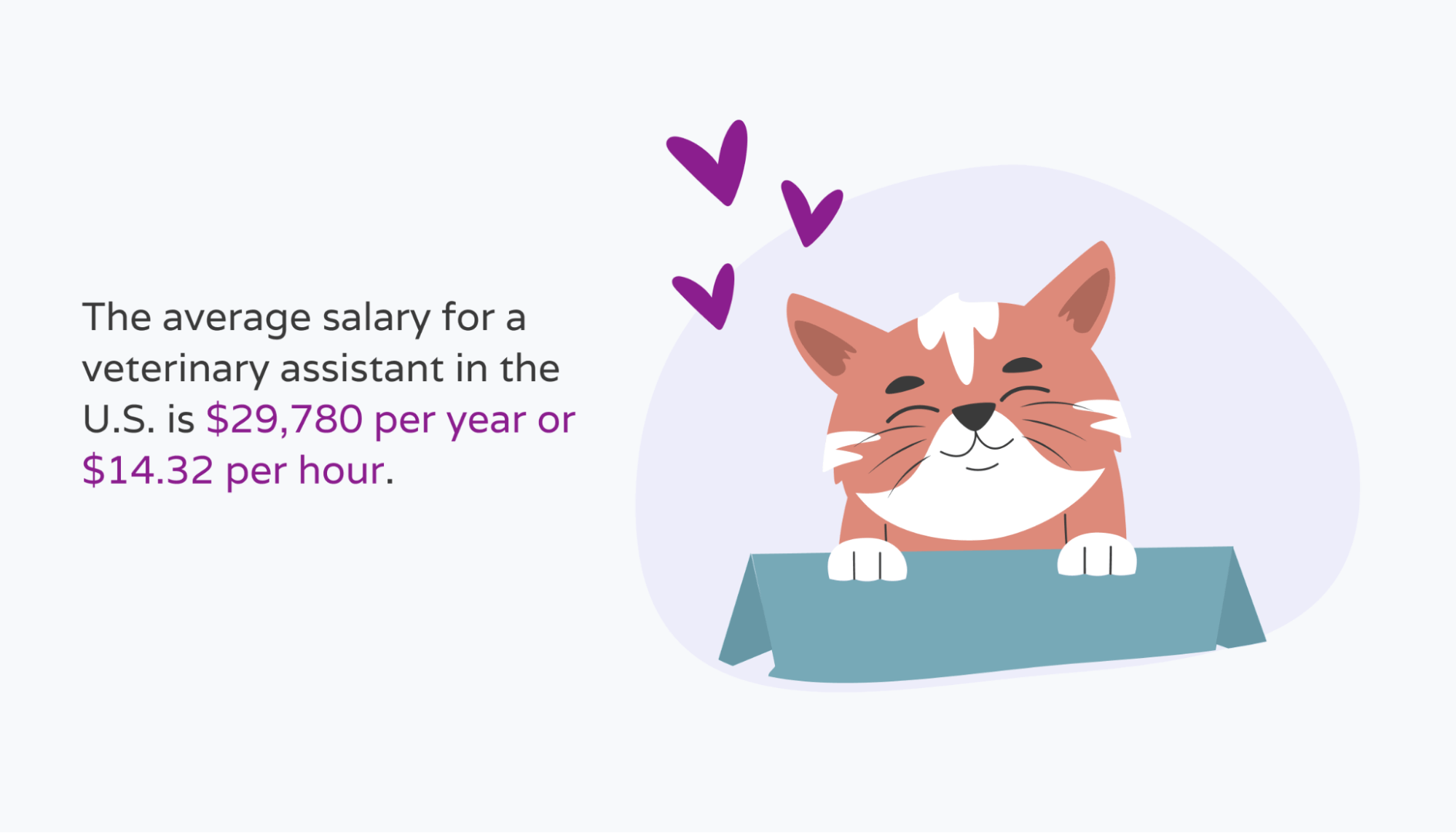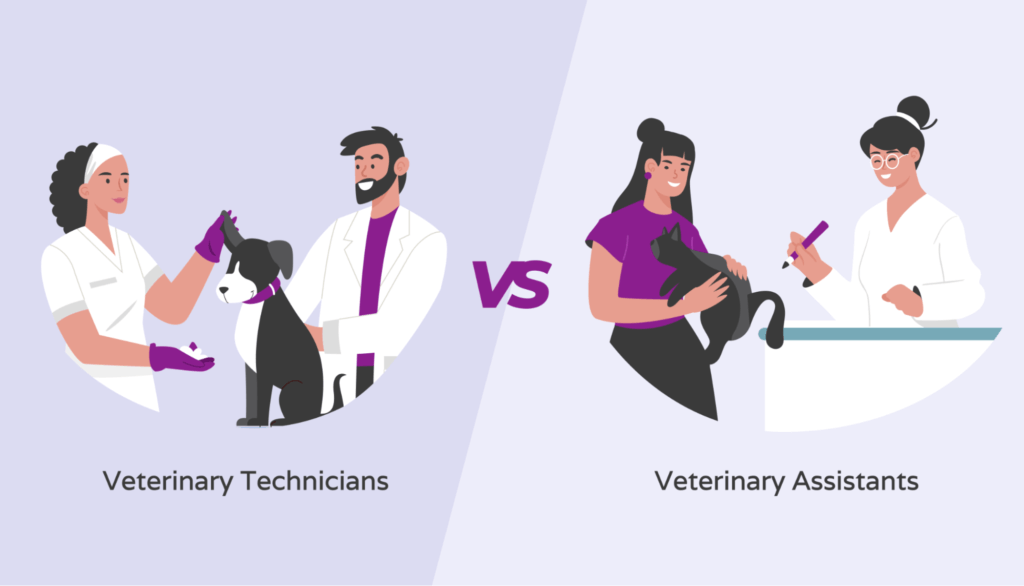Vet techs and vet assistants both support licensed veterinarians. However, they each have a unique list of job duties.
Whether your veterinary clinic needs help with specialized tasks or more general administrative assistance, you may be considering hiring one of these workers.
To help you decide on whether to hire a vet tech or a vet assistant, we've put together this side-by-side comparison guide. In this article, we'll discuss the average annual wage for vet techs and vet assistants.
You'll learn about the types of duties they can do, the minimum education requirements, and the skills to look for.
Finally, we'll give you a third option. We'll explain what a Veterinary Healthcare Virtual Assistant (VHVA) is and how they can fill the gaps in your veterinary hospital or clinic.
What are veterinary technicians and veterinary assistants?
Veterinary technicians and assistants focus on animal health. They work in a range of settings, including animal hospitals and veterinary offices.
Vet assistants take care of animals and perform various administrative tasks, such as answering phones and printing documents.
Vet techs have specialized training and perform assistant tasks. For example, they offer support during surgery and administer medication.
Both roles are in demand. According to the Bureau of Labor Statistics, the job growth rate for veterinary assistants is predicted to be 19% from 2021 to 2031. Right now, there are around 103,500 of these positions in the US.
The stats are similar for vet techs. From 2021 to 2031, job growth is predicted to grow by 20%. Today, there are 122,800 vet tech positions in the US.
If you need support, a Veterinary Healthcare Virtual Assistant could be the answer. Our VHVAs are experienced and can take care of repetitive tasks.
For example, the Hello Rache team can answer phones, transcribe documents, and manage emails. Click here to learn more about our services.
What is the difference between a vet tech and a vet assistant?
Veterinary technicians and veterinary assistants both work with animals. They can be employed by private clinics, emergency care services, animal welfare organizations, and diagnostic laboratories.
The roles aren't the same, however, as the daily duties, education requirements, licenses, and skills can vary. Here's a rundown of the differences between the two positions:
Daily duties
The main difference between a vet technician and a vet assistant is the types of job duties they can do.

Let's start with vet techs. They can do more technical tasks and work closely with the vet team. They're often there to assist the veterinarian during surgery and examinations.
Veterinary technicians can take laboratory samples, including blood and urine samples. They perform x-rays and care for animals during examinations.
Vet techs sterilize equipment for surgery and get animals ready for operations. They can administer medications, anesthetics, and immunizations.
Depending on the veterinary practice, vet techs may also be responsible for grooming animals.
On the other hand, there are veterinary assistants. Some of their duties overlap with that of vet techs, but they offer more general support.
For example, vet assistants answer phone calls, schedule appointments, check medical histories, and keep the clinic tidy. They monitor pets after surgery and check for changes in animal behavior.
They clean cages and perform routine animal care, such as feeding and grooming pets.
Both team members can work full-time or part-time. At an animal hospital or a facility with extended opening times, vet techs and vet assistants may be asked to work irregular hours.
Education requirements
If someone wants to work as a veterinary technician, they'll need to complete a veterinary technology program. This is usually a 2-year associate's degree with additional work experience.
Alternatively, some people choose to get a bachelor's degree to be hired as a veterinary technician.
The associate degree covers a range of areas. For example, vet tech students learn about veterinary procedures and surgery, dental technology, radiology and tests, giving anesthesia to animals, and how to administer medicine. The course includes practical and theoretical components.
Besides a high school diploma, veterinary assistants usually don't need formal education. A vet assistant is an entry-level position that supports the veterinary team.
Veterinary assistants get hands-on training and are supervised by senior staff members. Having customer service or clerical experience can be an advantage.
Vet assistants who are passionate about animals may enroll in a veterinary technician program and study while they work.
Skills
Veterinary care is a specialized field. Anyone working in this industry needs to enjoy working with animals and pet owners.

If you're considering hiring a vet tech or a vet assistant, there are a few skills to look out for. For example, good communication is essential for both roles, and this includes both verbal and written communication.
A veterinary practice is a team environment, so they'll need to work well with others. Pet owners can be worried about their animals, so compassion is another key skill.
Pets can have different temperaments and conditions. And there are many different types of animals, including dogs, cats, mice, rabbits, and reptiles. Animal handling skills and confidence are essential.
All vet team members need a patient and caring nature. Manual dexterity and physical fitness are also requirements for these job types.
Because vet technicians perform more advanced tasks, such as collecting blood samples and giving anesthesia to animals, they need technical skills. An understanding of veterinary medicine, laboratory procedures, and surgical equipment is important.
Vet assistants benefit from customer service skills, computer skills, and office experience.
Remember, if you only need support with administrative tasks, a Veterinary Healthcare Virtual Assistant can be an affordable, efficient alternative to an in-person veterinary assistant.
Licenses
Veterinary assistants don't need a license or professional certification. However, some may choose to study for Approved Veterinary Assistant (AVA) designation.
The requirements for veterinary technicians vary between states. In most cases, they need to pass the Veterinary Technician National Examination (VTNE).
Average salary for a vet tech
How much does a veterinary technician make? The national average salary for vet techs in the US is $36,850 or $17.72 per hour.
Those working in research typically make more than those in veterinary clinics. Education, skills, and experience can also have an impact on wages.
The average salary also varies depending on the area. For example, veterinary technicians in the District of Columbia make the most, averaging $68,110 per year.
Next is Washington, where the mean wage is $47,550 per year, followed by New York at $45,560 per year.
Vet techs in California make an average salary of $45,140, and in Connecticut, they make $44,380 per year.
Montana is one of the lowest-paying states; the average annual salary for a vet tech there is $32,980. Texas is similar; their average salary is $33,040 a year.
In Florida, the average vet tech salary is closer to the national average at $35,840 per year.
Average salary for a vet assistant
A veterinary assistant typically makes less than a veterinary technician.
The average annual salary for a vet assistant in the US is $29,780 per year or $14.32 per hour.

Once again, the salary varies depending on where you live. One of the highest-paying states for veterinary assistants is Maine. In this state, the average salary is $40,900 per year or $19.66 per hour.
In Massachusetts, the average annual salary is $39,140, and in Rhode Island, it's $38,850.
New York is also above the state average, with a median salary of $36,850. Alaska isn't far behind at $36,450 per year.
Arkansas is on the lower end of the scale, where vet assistants make around $27,800. Texas is similar, with an average annual salary of $28,410.
Compare this to Virginia, where it's $30,500 per year, and Oregon, at $34,580 per year.
What is a Veterinary Healthcare Virtual Assistant?
A Veterinary Healthcare Virtual Assistant (VHVA) is an alternative to an in-person employee.
VHVAs work remotely and are available whenever you need support. You can focus on providing quality care for your animals while the VHVA keeps on top of your admin.
For example, they can update patient files, schedule appointments, and transcribe documents. They can even scribe in real-time during appointments via video chat.
We've discussed the average salary for vet techs and vet assistants. Did you know that a VHVA from Hello Rache costs just $9.50 an hour?
When you choose us, you'll get access to experienced workers. You won't need to find extra office space, and you'll never have to pay overtime. Our team members have a range of skills, including communication, time management, and medical knowledge.
They're tech-savvy, with strong computer and typing skills. Many of our team members have additional education in healthcare.
How can a VHVA help your veterinary clinic?
A VHVA can do many of the same daily tasks as a new employee. If you need help with clerical duties in your veterinary clinic, choosing a VHVA can be a cost-effective solution.
Let's take a look at how a Veterinary Healthcare Virtual Assistant can support your team:
1. Answering phones
Answering phones can be a time-consuming task. VHVAs can manage your phone line so your team can spend more time providing care to the animals.
VHVAs can talk to pet owners and answer any questions over the phone. For example, they may be asked about opening hours, immunizations, or emergency care.
VHVAs can schedule vet appointments and manage calendars. They can take messages and call pet owners to confirm appointments.
Hello Rache VHVAs have excellent phone communication skills. They are clear and confident and will help you maintain your good reputation.
2. Transcribing documents
Another task VHVAs can do for you is transcription. They can take any recording and turn it into a professional computer document.
Alternatively, your VHVA can transcribe in real-time via video chat or phone.

They're fast and efficient, and they understand medical terminology.
By outsourcing your transcription, you'll have more time between appointments. This means you can finish your work on time and have a better work-life balance.
Having a VHVA can take the pressure off your existing team without sacrificing accurate transcription.
3. Inputting data
Is your team overwhelmed by paperwork? A VHVA can input data and help you get organized.
They can update files, including contact information, treatment plans, and pet history. This information can be shared between team members, minimizing errors.
Whether you're using dedicated animal health technology or a common program such as Microsoft Excel, our computer-savvy team can get the job done.
Additionally, VHVAs can perform general bookkeeping tasks. For example, they can input expenses, generate reports, and create invoices.
4. Educating patients
Being a pet owner is a long-term commitment. When you share the right information, owners learn how to take care of their animals properly.
A VHVA can offer this support. For example, they can create information packs and flyers. These could be on topics such as puppy immunizations, recommended diets, or exercise regimens.
A VHVA can also answer questions via phone, email, or social media. If they're unsure of an answer, they can ask someone on your team for the right advice to give.
VHVAs can also share reminders. For instance, if a pet is overdue for an appointment, the VHVA can compose a reminder letter or make a phone call.
5. Updating social media
Social media is a convenient way to connect with your local community. Your Facebook page or Instagram account can help you grow your clinic.
You can promote your services and events on social media. For example, you may be hosting puppy school classes or sessions on animal handling.
You can also use social media for reminders and news. You could be focusing on oral health for pets or want to remind people to keep their animals inside during storms.
To get the most from your social media, it should be updated regularly. A VHVA can help you schedule your content and engage with your followers. If someone leaves a comment or message, the VHVA can reply to them for you.
Vet techs vs. vet assistants
There are a few key differences between vet techs and vet assistants.
Vet technicians usually have an associate's degree. They assist during surgery, perform tests, and monitor animals.
Vet assistants don't need a degree. These team members help with administrative tasks, answer phones, and feed animals.
Vet techs generally have a higher salary and more responsibility than vet assistants.
If you need help in the office, a VHVA is a good alternative to a new employee. These remote workers can do a variety of tasks, including answering phones, scheduling appointments, and updating files.
Want to know more about our services? Get in touch with Hello Rache today.
Discover what Hello Rache can do for you and your practice
Tell us a little about your practice & we will contact you within 24 hours.




